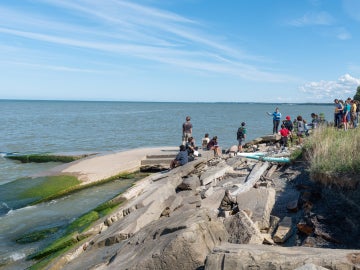'Brothers at War'
September 26, 2013
Amanda Nagy

Professor of East Asian studies Sheila Miyoshi Jager.
Photo credit: Tanya Rosen-Jones
Associate Professor of East Asian studies Sheila Miyoshi Jager brings her expertise in Korean history, politics, and culture to the masses in her latest book, Brothers at War: The Unending Conflict in Korea. The book, published by W.W. Norton in the U.S. and Profile Books in the U.K. in July 2013 to coincide with the 60th anniversary of the signing of the Korean War armistice, has received praise from the New York Times, the Economist, the Wall Street Journal, and many other publications for its comprehensive and balanced history of the Korean War.
Jager was nominated by her publisher and selected by the Library of Congress to participate in the 2013 National Book Festival on September 21 and 22 in Washington, D.C. Her presentation can be viewed on CSPAN’s BookTV.
In Brothers at War, Jager draws from newly available diplomatic archives in the U.S., the UK, China, South Korea, the former Soviet Union, and East European nations. Her narrative ranges from the middle of the World War II—when Korean independence was fiercely debated between Roosevelt, Stalin, and Churchill—to the present day, as North Korea, with China’s aid, stockpiles nuclear weapons while starving its people.
Sixty years after the North Korean troops crossed the 38th parallel into South Korea, the Korean War has not ended. To this day, no peace treaty has ever been signed by either side. Jager brings to life the bitter, ongoing struggle for a position of legitimacy—a “brother’s war”—which continues to fuel tensions on the Korean peninsula and the region.
At Oberlin, Jager is director of the East Asian Studies program. Her courses include Korea: Past, Present and Future, a First Year Seminar on The Cold War in Asia, and an upper level seminar on the Korean War. Next semester, she will offer a new course called The Opening of Korea, 1876-1905, which she says pertains to a new topic of research that will eventually lead to a book.
Jager’s previous works on Korea are academic books. Her first book was on Korean nationalism, Narratives of Nation Building in Korea: A Genealogy of Patriotism (M.E. Sharpe, 2003), and focused on how particular gendered tropes have had a persistent and pervasive life in the fashioning of Korean modernity. Her second book is an edited volume (with Rana Mitter, Oxford University) entitled Ruptured Histories: War, Memory and the Post-Cold War in Asia (Harvard University Press, 2007).
Jager says she set out to write a history of the Korean War that was both scholarly and accessible to lay readers. She also wanted to write a book that is broad and comprehensive in scope. “Much of the academic history today has fragmented into various specialty fields—military history, cultural history, diplomatic history, etc.,” says Jager. “I wanted to write book on the Korean War that combines many of these sub-fields into one work. This book pays attention to the operational history of the war as much as it does the cultural, social, and political dimensions of the conflict.”
But what really sets Brothers at War apart from other works on the conflict is that Jager examines the war beyond the 1953 armistice up to the present day. “This was an important gap in the literature that I wanted to fill,” she says. “Most of the scholarly literature on the war is concerned with the question of origins, who started the war or why the war began, and/or on the war years from 1950 to 1953; my book covers those issues. I am more concerned with the war’s continuing impact on the region and the world.”
Jager spent about seven years researching and writing the book. One of her main goals, she says, was to include elites as well as ordinary people, and individual choices and collective experiences across wide cultures—American, Korean, and Chinese. “In addition to traditional sources, I also looked for sources in places where most traditional historians of the Korean War have not: memoirs, letters, newspaper stories, and editorials. I also looked at museum exhibitions and memorials. And I had the good fortune of being able to use materials from South Korea’s Truth and Reconciliation Commission, which ran from 2005 to 2010, and published thousands of first-hand South Korean witness accounts of the war.”
An ambitious scholar, Jager is equally dedicated to her teaching. She says her courses evolve with her research. In her Korean War seminar, “the students who have enrolled are uniformly fantastic, and I often learn from them, as well. I was so excited to teach them about all the new discoveries I was making while researching the book.
“My first-year seminar on the Cold War brings other joys because you have this tremendous opportunity to introduce freshmen to the issues, events, and personalities of the Cold War, as well as new ways of thinking about history.”
Jager frequently involves students in her research, whether it’s pouring through archives, organizing symposia, or editing academic works. “I’ve been really lucky in the students I’ve met at Oberlin, and I’m still in touch with quite a few of my former students.”
You may also like…
Research Roundup
Every day, Oberlin’s faculty and students produce scholarly work that uncovers new insights into how we understand the world, particularly in the areas of sustainability and the environment.
Three Things with Jillian Scudder
Oberlin’s astrophysicist-author shines a light on our dark universe.
My Cousin the Comb Jelly
The research of Darrin Schultz ’13 deepens our insights into animal evolution.


